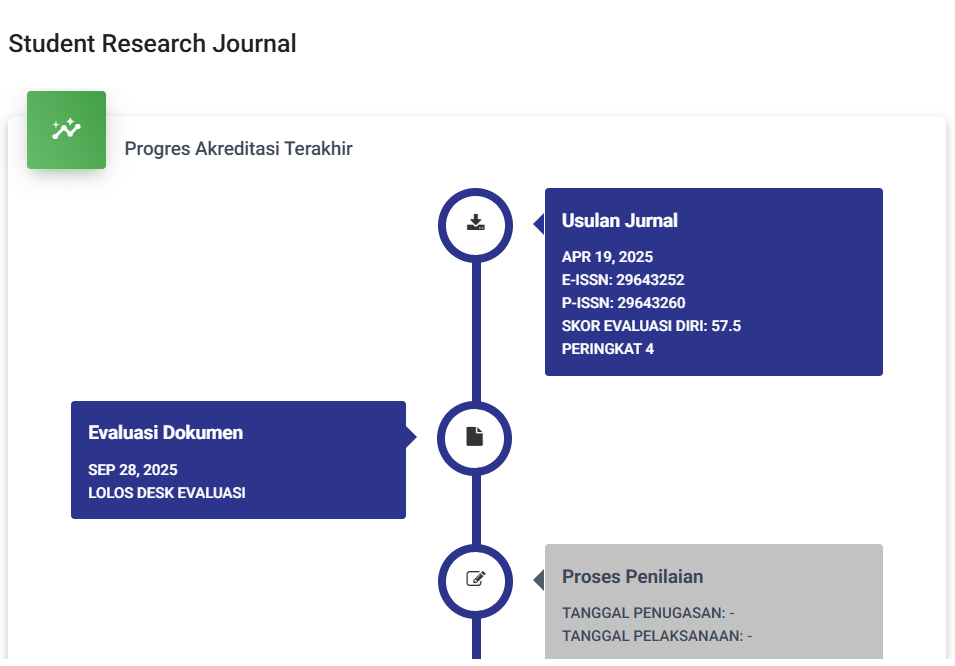Pengolahan Hasil Non-Test Angket, Observasi, Wawancara Dan Dokumenter
DOI:
https://doi.org/10.55606/srjyappi.v2i3.1343Keywords:
non-test, interview, observation, questionnaire, documentaryAbstract
Education cannot be separated from evaluation because evaluation is one of the most important basic components in education which must be carried out in a planned and systematic manner, of course, to know and determine student learning outcomes. Evaluation is divided into two categories, namely test and non-test. The test form of evaluation is often used by teachers, but non-test evaluation is not much sought after by teachers because the instrument is quite complicated. Therefore, the aim of this research is to find out how non-test evaluation is used and its obstacles to learning. The approach used in the qualitative approach is the description method and data collection techniques through interviews. From the data we got, the school uses non-test evaluation techniques as stated in the assessment in the 2013 curriculum in accordance with the learning objectives. Apart from that, there are obstacles experienced by teachers in using non-test evaluation, such as teachers' lack of skill in preparing non-test instruments, students who do not understand the implementation of non-test evaluation, lack of time in making non-test instruments. To overcome existing obstacles, teachers must improve their skills in making non-test instruments, teachers must choose what form of test they want to use, and teachers must prepare evaluation instruments before carrying out learning.
References
Anas Sudijono, Pengantar Evaluasi Pendidikan, Jakarta: Raja Grafindo Persada, 2005
Anas Sudiyono,Pengantar Evaluasi Pendidikan(Jakarta: PT Raja Grafindo Persada),
Ani Rusilowati, Pengembangan Instrumen Nontes, Jurnal Seminar Nasional Pendidikan, Pascasarjana UNS 2013
Atok Fuadi,Sistem Pengembangan Evaluasi(Surabaya: Ponorogo Press, 2006)
G.J. Reiner, History its Purpose and Method. Oxon: Routledge. 1997.
Hasyim Hasanah, Teknik Teknik Observasi, Jurnal At-Taqaddum, Vol 8, No1. Juli 2016.
Ina Maglalena, Nurlaila Maghfiroh, Dkk. Penggunaaan Teknik Evaluasi Non Tes Pada Pembelajran IPS, Jurnal Pendidikan Dan Sains Vol 3, No 1, April 2021.
Kemenag, Kementerian Agama Republik Indonesia. “PENGEMBANGAN DAN PENGOLAHAN NILAI HASIL BELAJAR,” (Jakarta: Website Kemenag, 2024)
Kenneth Wolf dan Mary Dietz, “Teaching portfolios: Purposes and possibilities,” Teacher education quarterly, 1998,
Lia dan Wiwin Setianingsih, STUDI MANAJEMEN MARKETING BERBASIS ONLINE (PENELITIAN PADA UMKM PRODUKSI MEBEL DI Desa TAMANSARI BABAKAN MUNCANG I KOTA TASIKMALAYA), Jurnal Maneksi Vol 9 No.1 Juni 2020.
Mochhamad Syahroni Firdiansyah, MANAJEMEN PENGELOLAAN WAHANA REKREASI OLAHRAGA DI WISATA WATER BLASTER SEMARANG TAHUN 2013, Journal Of Physical Education, Sport, Health Dan Recreations,2015.
Muthuswamy Easwaramoorthy dan Fataneh Zarinpoush, “Interviewing for research,” Imagine Canada 425 (2006)
Muthuswamy Easwaramoorthy dan Fataneh Zarinpoush, “Interviewing for research,” Imagine Canada 425 (2006).
Huda, Nuril, Difi Dahliana, dan Akhmad Fauzi Aseri. “Improving The Quality of Prophetic Intelligence-Based Moral Education Programs with the CIPP Model.” Eurasian Journal of Educational Research 107, no. 107 (2023): 1–16.
Resti Alawiyah, “Pengolahan Data Hasil Penilaian Nontes”, (Universitas Jember Fakultas Keguruan Dan Ilmu Pendidikan: 2019),
Sawaluddin Dan Muhammad Siddiq, Langkah-Langkah Dan Teknik Evalusi Hasil Belajar Pendidikan Agama Islam, 28
Sugiono,Metode Penelitian Kuantitatif Kualitatif Dan R&D(Bandung: Alfabeta, 2011
Zainal Arifin, Evaluasi Pembelajaran: Prinsip, Teknik, Dan Prosedur (Bandung: Remaja Rosdakarya, 2016
Downloads
Published
How to Cite
Issue
Section
License
Copyright (c) 2024 Rima damayanti, Nuril Huda, Dina Hermina

This work is licensed under a Creative Commons Attribution-ShareAlike 4.0 International License.








